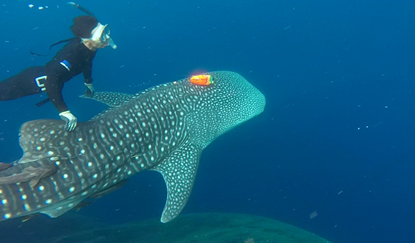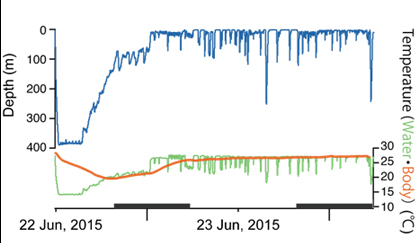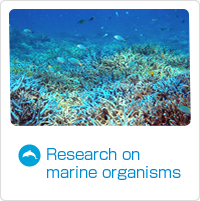- Home
- Okinawa Churashima Foundation Research Institute
- Studies of Marine Animals
- Research activity report
- Publication of scientific paper on the stability of body temperature in whale sharks.

Research on marine organisms
Publication of scientific paper on the stability of body temperature in whale sharks.
In collaboration with the Organization for Marine Science and Technology, Nagasaki University, and Atmosphere and Ocean Research Institute, the University of Tokyo, the body temperature stability of whale sharks has revealed by studying their behavior in the field.
The whale shark is known as the world's largest fish, with the largest being over 12 meters long and weighing dozens of tons. When the whale sharks were released into the wild, behavioral recorders and thermometers were attached to the sharks, and the behavior and changes in body temperature were measured for the first time in the world. When the temperature of the surrounding water changed due to vertical movements of several hundred meters, the body temperature of the whale sharks changed slowly, demonstrating the stability of the body temperature due to its large size. It was also confirmed that the upper limits of the whale sharks’ body temperature were similar to the sea surface temperature. This indicates whale sharks are not endothermic, relying on the heat they produce to maintain a high body temperature, but are ectothermic, relying on the temperature of the outside to regulate their body temperature. When we compared the whole-body heat-transfer coefficients of fishes of a wide range of body sizes, from Bluefin tuna fry less than 1 g to whale sharks greater than 1 t in this study, referring to the literature, suggesting that the larger the body size, the less the body temperature changes. The whale sharks that we released were diving in the open ocean at a very cold depth of over 1000 m with a water temperature of 3–4°C. The reason for these dives is not clear, but it is thought that the stability of the body temperature derived from the large body makes such dives possible.
Authors
Itsumi Nakamura, Rui Matsumoto, Katsufumi Sato
(Bold letters: Staff members of Okinawa Churashima Foundation)
Title of Paper
Body temperature stability observed in the whale sharks, the world’s largest fish
Title of Journal
Journal of Experimental Biology
DOI
https://jeb.biologists.org/content/early/2020/05/02/jeb.210286

Released whale shark
Time-series depth, water and body temperature data obtained from a whale shark
Copyright (c) 2015 Okinawa Churashima Foundation. All right reserved.




























